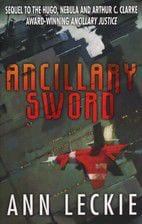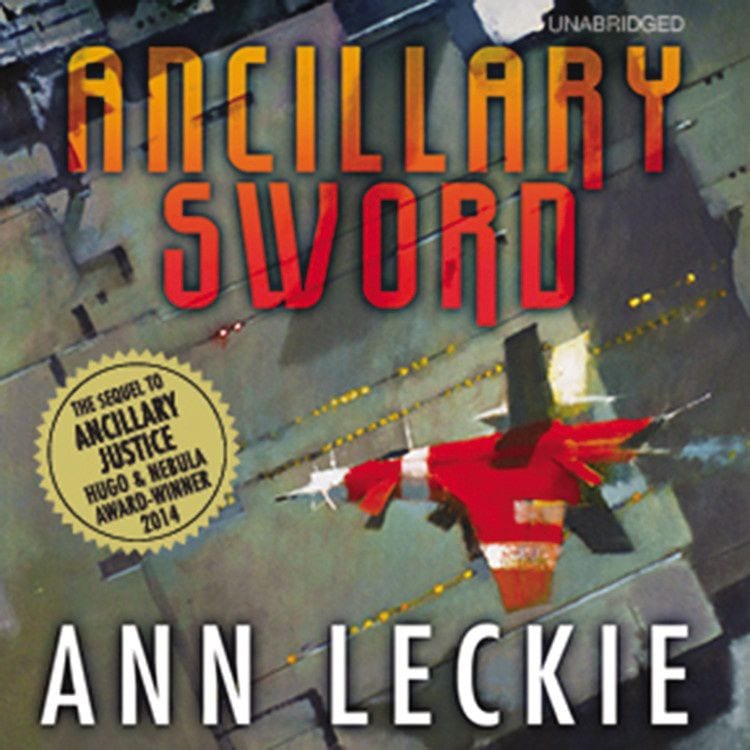 “Ancillary Sword” by Anne Leckie
“Ancillary Sword” by Anne Leckie
Orbit, 2014, 400 pages
Available in: hard cover, paperback, ebook, and audiobook.
This review contains minimal spoilers.
“Ancillary Sword” is the second book in the Anne Leckie’s Imperial Radch series. The first book, “Ancillary Justice,” was a smashing critical success, winning awards and being widely acknowledged in science fiction genre publications. As the story of an artificially intelligent war machine decimated by a colonialist overlord struggling with alien intervention at the end of a long campaign of conquest and the search for justice for the victims of a violent occupation, complete with interesting linguistic stylistic details such as a default female pronoun, it’s easy to see how it captured the imagination of the sci-fi industry. “Ancillary Justice” was reviewed last month in this publication.
In “Ancillary Sword,” following the events of “Ancillary Justice” which I will not spoil here, an uneasy peace exists between Anaander Miaanaai and Breq, who has been adopted into the Miaanaai clan very much against her will. Breq has been promoted to Fleet Captain and given her own ship—the “Mercy of Kalr”—and sent to protect a remote agricultural system called Athoek at the edges of the Radch empire. She maintains her association with Seivarden from the previous novel, and Miaanaai burdens her with the young Lieutenant Tisarwat, a promising young officer of the Radch.
Before long, Breq realizes that Miaanaai has murdered Tisarwat’s original personality and installed a copy of herself in her brain, a process similar to the manufacturing of ancillary soldiers described in the first book. Breq has the implants surgically removed in the hopes that Lieutenant Tisarwat will grow back a personality. Upon arrival at Athoek station, Breq becomes suspicious of the larger ship already stationed there, the “Sword of Atagaris.” She also finally meets the sister of her beloved, deceased Lieutenant Awn, but the sister wants nothing to do with Breq. Add in a translator and cultural attaché of the alien Presger—a species which is blankly stated to be capable of destroying the Radch empire without effort—and a cultural and economic divide, and the stage is set, a stage that the keen observer will notice has been significantly shrunk from the scope of the previous work.
“Ancillary Sword” suffers terribly for being the second book in a trilogy, and further, the indifferent Breq and her blanket statements about the realities of the world—the superiority of the Presger, the need for social justice, the combat prowess mismatch between a Sword and a Mercy—seem to be basically inaccurate, which robs them of all meaning. Rather than making the world seem clearer and bigger, they cast into doubt previous assurances.
Further, Breq as a character is deliberately flat and indifferent. She really only shines when her blankness is contrasted with the passion of another. However, Breq is now the fleet captain of a ship full of people who literally strive to behave exactly like her, making her at best a difficult contrast to make, and as a result, the few moments of humanity seem forced.
It’s also worth mentioning that to some extent, the Radch as shown are terrible people, and it’s draining. A discussion about AI sex drives is burdened by the fact that characters reveal that they have routinely ordered ancillary slaves to have sex with them, which is pretty heavy. The fact that Lieutenant Tisarwat is murdered and her personality is replaced by that of a thousand-year-old war criminal before being drugged and dumped aboard a starship where she has that personality yanked out again is treated as more or less just one of those things you have to deal with. The Radch are imperialist, racist, violent, hilariously sulky and superstitious, and weirdly tea-obsessed. They’re a well-realized culture with many, many bad aspects and a curious predilection for doubled As.
The biggest problem with “Ancillary Sword,” however, is that the book seems a regression. The galaxy-spanning adventure of the first book—even described as it was by an intentionally robotic character—gave us a sense of motion. “Ancillary Sword” takes place almost entirely in Athoek and environs. Much is made of expensive tea, and the same story beats about terrorist violence between an oppressive slaveholder caste and an ethnic minority abused and enslaved are simply recycled from “Ancillary Justice.”
But now Breq has power, and so she fights against them, using the money and influence she has on behalf of the aforementioned thousand-year-old war criminal. Meanwhile, there are whispers about the Presger and the Radch home Dyson Sphere and ghost systems and ancient tea sets… and why can’t we be reading about those things instead of what we are reading? Why are we, the readers, being lectured about fictional tea shops right now? It is intensely frustrating.
I have no doubt but that the final part of the trilogy will be a step up, but this book is very disappointing.
There are also some problems with the audiobook version. I quite enjoyed the reading of “Ancillary Justice” by Celeste Ciulla. The new narrator—at least in the Audible version—is Adjoa Andoh, who is very different. She pronounces the names differently, and sometimes with (grammatically interesting, but frustrating) flare. She also has several character voices that are high-pitched to the point of physical discomfort when listening at normal volume through headphones. There are more songs, of course, as in the previous book, but for some reason, they are rather more irritating this time. I would strongly recommend the paperback version. Or at least, some aspirin. At 11 hours 43 minutes, it’s a long time to be annoyed.




